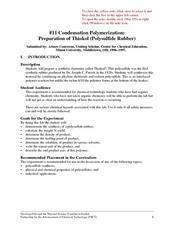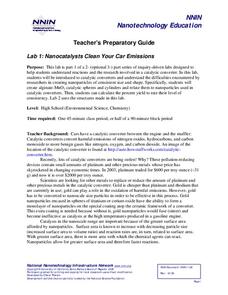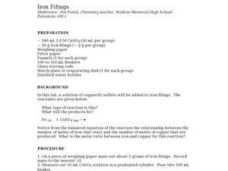Curated OER
Condensation Polymerization
This organic chemistry lab activity is appropriate for teaching polymerization, percent yield, melting point, or the types and uses of polymer materials. Chemistry pupils imagine that they are working for a company to develop a special...
Curated OER
Condensation Polymerization: Preparation of Thiokoll® (Polysulfide Rubber)
This lab activity is geared toward experienced chemistry learners, in particular, those who are familiar with organic chemistry. They will create a synthetic elastomer and then make observations and measurements of its different...
Kenan Fellows
Reaction Stoichiometry—How Can We Make Chalk?
What is a reasonable percent yield in the manufacturing process? Scholars develop a process for producing chalk in the third instructional activity of a six-part series. Then, they must determine the theoretical and percent yield....
Curated OER
Molarity, Excess and Percent Yield
In this molarity worksheet, students are given balanced equations and they are to calculate the mass or volume of reactants and products. Students calculate the theoretical, percentage, and actual yield for chemical equations. This...
Curated OER
Condensation Polymerization: Preparation of Nylon 6/6
Students participate in a lab activity in which they synthesize nylon 6/6, calculate the percent yield by mass, identify the polymer as thermoplastic or thermoset, and determine the melting point, density and end-product use of the polymer.
National Nanotechnology Infrastructure Network
Lab 1: Nanocatalysts Clean Your Car Emissions
What a big job for such a small particle. Young scientists learn about the role of nanoparticles in catalytic converters for cars. They conduct an experiment to create alginate-MnO2 catalytic spheres.
Curated OER
Iron Filings
Students conduct an experiment in which a solution of copper(II) sulfate is added to iron filings. They write and balance the equation for the reaction that occurs and calculate the amount of iron that reacted and the percent yield of...
Curated OER
I Have the Solution!
Students explain how to make solutions with specific concentration. In this chemistry lesson, students differentiate acids and bases. They calculate molarity of solutions.
Cornell University
Radical Reactions
The radical reactions of polymers seems abstract to many pupils, but this activity turns them into a fun building game. Scholars use dice and building pieces to build polymers. Then, they determine the theoretical and experimental weight...
Frostburg State University
General Chemistry Online: The Mole Concept
Resource provides notes on Moles and Stoichiometry. Deals with all book-keeping aspects, including as section on yields and limiting reactants. Includes lesson plans, lecture slides and notes, links to related websites, and frequently...
Science Education Resource Center at Carleton College
Serc: Molar Relationships: Observing a Single Displacement Reaction
In this chemistry lab, young scholars will investigate a single replacement reaction while also using knowledge of molar ratios to determine percent yields.










